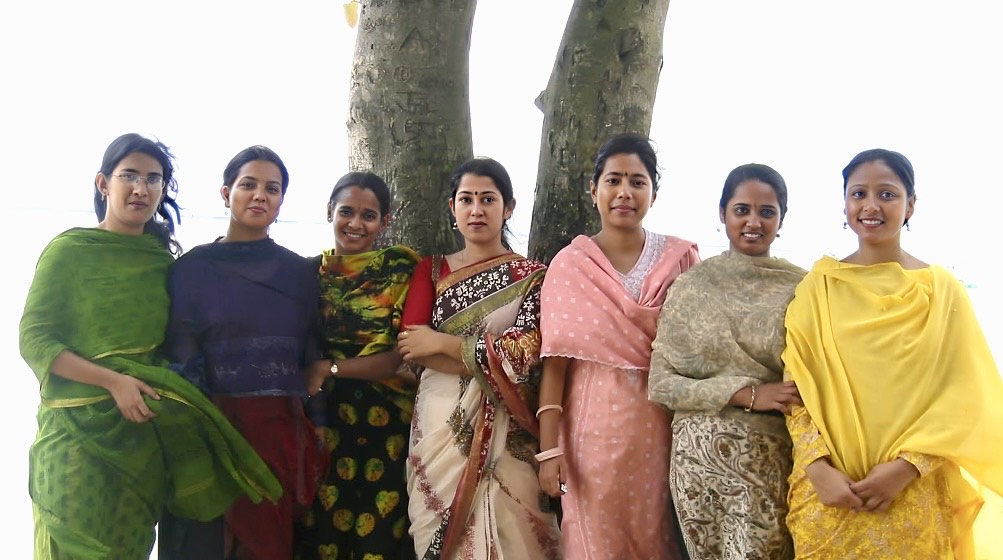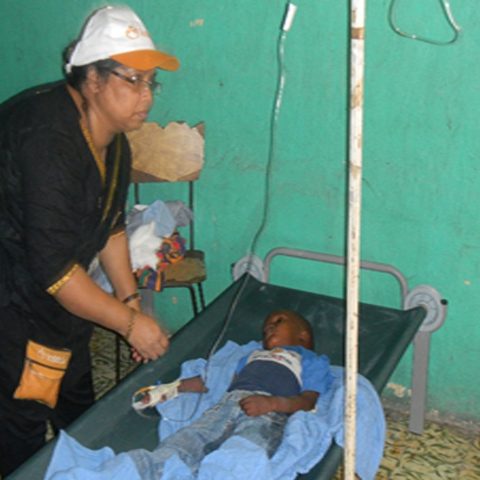
By Shamima Shiraji, Senior Research Investigator, Child Development Unit, MCHD
To some people in Bangladesh, the essence of the word “research” is an enigma; for many, it remains a subject of intense curiosity, especially when it comes to psychological research. Our journey to research in a remote, riverine area with challenging transportation was arduous.
As newly graduated psychologists from Dhaka University, we joined Matlab’s MINIMat (Maternal and Infant Nutrition Interventions in Matlab) study in 2002. Our journey started with Dr Fahmida Tofail’s PhD research work and later Dr Jena Hamadani’s research work. Notably, this study began with 19 components.
I am sharing memories of our experiences in the MINIMat study between 2002 and 2005. In this study, pregnant mothers were given micronutrients while also examining the effects of arsenic. A component of our study was to assess the neurodevelopment of the children of these mothers at 7 and 18 months of age.
We had to work under four sub-centres (Blocks A, B, C, and D) of Matlab. I cannot mention many others in each sub-centre here, but I always remember them. Project Manager Shahidullah Bhai must be remembered; I learned from him how to manage a large team efficiently. Pathan Bhai, Manoranjan Dada, Mozammel Bhai, Alauddin Bhai, Malina Didi, Jahanara Apa, Sufia Apa, Shanti Didi, and Hena Apa all supported us wholeheartedly.
At that time, the transport system from Dhaka to Matlab was risky. We used to travel by the MV Maharaj launch. On 19 February 2005, a storm hit this launch, sinking it and causing the death of over a hundred passengers, including Dr Masud and Chayan, who were working at icddr,b. Coincidentally, we survived that night. Later, we had to change vehicles five times while travelling on the Matlab-Gauripur road, which has 119 sharp bends; buses ply that road now.
Our journey began to expedite the research work along the serpentine Dhonagoda River in Chandpur-Matlab. Some of our psychologists were moving with the rhythm of the river’s waves, enduring heavy rains, floods, hot sun, and bone-chilling winters, sometimes in speedboats, sometimes in launches. Sometimes there was little space among the crowd of people on the roof of the launch, where we would even have breakfast.
In the first phase of the study, we conducted psychological assessments on 7-month-old children. Blood samples were taken a day before the test as part of another study component. Motivating mothers to allow venous blood samples from children of this age was challenging. Mothers feared blood samples would cause their children to lose weight, making them thin.
On 10 March 2004, while I was working in Block-D (Torkey), a terrible incident happened. The day after a blood sample was taken, when the child was brought in for a psychological test, something unexpected occurred. The entire session was video-recorded as we conducted the assessment. The test was recorded and later scored on the children’s performance record form after watching the video. As our working pattern differed from the conventional system, the test room door was kept closed to maintain a quiet, noise-free environment. Like every other day, I conducted the test with the door closed. Suddenly, as the video was being recorded, the mother ran out of the room with her baby, opening the door and alarming everyone around. This happened despite the fact that we had previously obtained consent from the mother. She mistakenly thought I was drawing all the baby’s blood with a video camera. It was a false belief, but it caused a lot of trouble for everyone at the clinic, including me, as we tried to bring the situation back to normal.
In Matlab, we often had to work during power and network failures, which made it very difficult to transfer our recorded files on time and complete scoring within the specified period. There was also a requirement to complete the work on time, so submission had to be done beyond office hours, even after returning home.
The irony of the walkie-talkie must be mentioned here. Since most of the workers in Matlab commuted from Dhaka, it was routine to return to Dhaka on the last day of the workweek and come back on Sunday morning. Interestingly, the famous walkie-talkies would ring in every block before office hours started on Sundays, ensuring we reached the office on time. If we were ever a little late, every icddr,b staff member, including surveillance staff, would know.
We slowly began to adapt to the challenging environment and the difficulties. However, aiming to overcome these challenges, we worked in the field, crossing rivers and canals. During the 2004 floods, our office blocks and roads were submerged. Then we gathered all our important items, such as datasheets, TVs, VCRs, and video cameras, and handed them over to the Dhaka office with responsibility.
Our two renowned supervisors, Dr Jena Hamadani and Dr Fahmida Tofail, have tirelessly continued their work in early child development research both locally and abroad. We drew inspiration from them to do good work. We learned courage, dedication, and commitment from this work. Self-motivation is also important here.
The current professional status of this team of psychologists can inspire the younger generation. Out of the seven members, two have completed their studies through scholarships (AusAid, Erasmus Mundus) and are now engaged in research activities both domestically and internationally. One is an eminent psychologist in the country, while another has established herself as a teacher. Additionally, three members currently work in the ECCD division at icddr,b. One of them has already completed a PhD, and another is conducting research on neurodevelopment in children.
Despite the geographical challenges of our country and people’s misconceptions, we have managed to bring research on children’s neurodevelopment into the digital age. Establishing this work on such a large platform for public health in remote and underdeveloped areas of the country is indeed a story of overcoming numerous obstacles.

